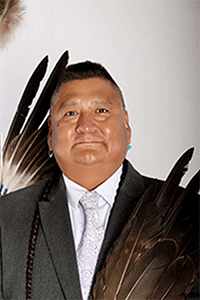Rev. Calvin Hill (MDiv' 11) is the pastor of First UMC of Newcastle, Wyoming. He received his Master of Divinity from Garrett Evangelical Theological Seminary, and he is getting his Doctor of Ministry from Claremont School of Theology. He is the chair of the Committee on Native American Ministries (CONAM) for the Mountain Sky Conference.
Garrett-Evangelical Theological Seminary is one of the 13 United Methodist seminaries supported by the Ministerial Education Fund apportionment of the United Methodist Church.
Rev Hill talks about the 4 Cs of Cross-Cultural Outreach and Discipleship: The 'Indigenous Perspective':
My mother taught me to train horses as my grandpa had taught her. The oldest of her siblings, her job was breaking and training wild mustangs. Her family lived on the Navajo reservation, where I grew up. Like countless other Indigenous people across America, I struggled with the English language, cultural identity, and eventually Christianity.
While learning to train horses, I framed a principled strategy for training called the four Cs: clarity, consistency, communication, and compassion. As I summed up the Four Cs philosophy, I recognized it fit any methodological course of training, belief, and —in this context— outreach to Indigenous People and subsequent discipleship.

CLARITY
A cross-cultural approach to outreach and discipleship in our Christian faith is ironically similar to horse training. The church and its leaders ought to analyze for clarity by listening and observing to identify language, family structure, and cultural practices. Clarifying these three values helps leaders understand prospective members and avoid sabotaging their outreach efforts. These three factors are invaluable for planning. They give a clear view of bridgeable language, family dynamics, and cultural practices. Clarity concerning the context of Indigenous People should inform the church’s approach to discipleship and evangelism.
However, many non-Native ministries continue to use “colonization style” outreach, which does not attract Indigenous People.
Today’s Indigenous People do not want to maintain assimilation rituals. Many know the reality of spirituality and want expressions of spiritual formation that ensure the survival of creation. One successful approach is to incorporate Indigenous creation stories, most of which are more geologically sound than the one in Genesis.
Church leaders need to find a common language, cultural practices, and innate work of God’s Spirit. The result will initiate a contextual approach and possibilities for other church communities.
CONSISTENCY
It is important to demonstrate faithfulness and genuineness in any outreach and discipleship process. To be effective, we need consistency.
Authenticity is vital in evangelistic efforts. We are all shaped by our culture and history, so if the Christian culture has shaped your inheritance, then live into it. We live in a time of religious, spiritual, and cultural experimentation, where well-formed faith knows little to nothing about Christian theology, and people are investigating different spiritual practices. Being your authentic self will help establish respectful relationships.
COMMUNICATION
In Western-dominant culture, people speak too much and do not listen well. Communication is not just about speaking and getting your point across. It is about listening, observing, contemplating, and then speaking. "Be still, know that I am God” (Psalm 46:10).
Knowing the level of interrelationship with the dominant white culture will help with communicating the classic themes of God, Christ, atonement, and eternal life, or it will help with finding related themes, such as creation, liberation stories, or future living in the New World.
This insight can help church leaders formulate an outreach and discipleship process.
COMPASSION
First, be compassionate with yourselves. You will make mistakes. Outreach and discipleship are not simple —especially among the Indigenous People. Their historic engagements with English-speaking (White) people have not been pleasant. And their response may not be what you anticipate. In some cases, the response might be a little harsh, so your feelings might get hurt. Be compassionate to yourself. People will recognize your need for self-care and will respond compassionately.
Indigenous People are caring, and their level of compassion is impressive. They share land, food sustainability, and ceremonial practices. Once they see compassion in others, they will trust and believe the compassion shared.
Jesus showed compassion for the demon-possessed man, Legion, in Mark 5, but also for the man’s community, as Jesus told him to “tell them how much the Lord has done for you and how he has had mercy on you” (5:19 NIV).
Indigenous people are compassionate, so those in ministry need to show the compassion of God.
I hope that the Four Cs will aid church leaders in constructing a contextual map for directing people to God, Christ, and The Holy Spirit that will create disciples to serve all people. The Four Cs serve as an outline for shaping directions in life.
excerpt from a story by Rev. Calvin Hill, pastor of First UMC of Newcastle, Wyoming.
Ministerial Education Fund
One of seven apportioned giving opportunities of The United Methodist Church, the Ministerial Education Fund is at the heart of preparing people for making disciples of Jesus Christ for the transformation of the world. The 13 United Methodist seminaries help students to discover their calling through the challenging curriculum. The fund enables the church to increase financial support for recruiting and educating ordained and diaconal ministers and to equip annual conferences to meet increased demands. Please encourage your leaders and congregations to support the Ministerial Education Fund apportionment at 100 percent.





